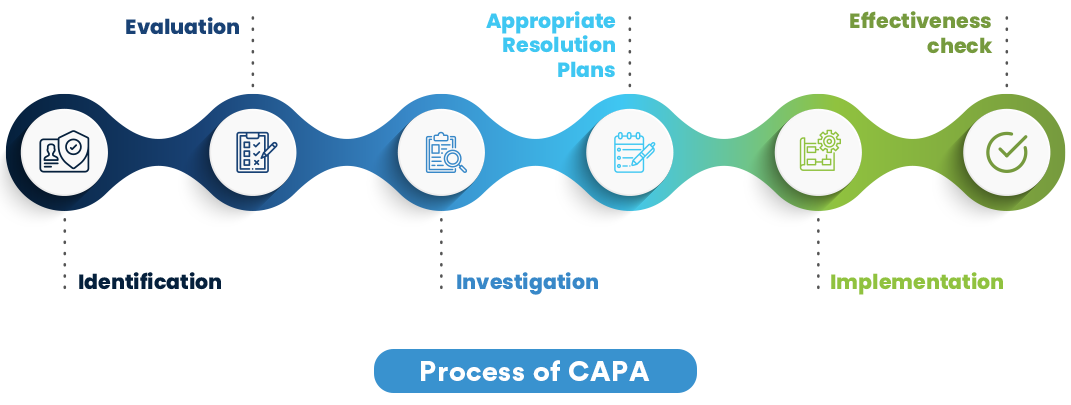In today’s rapidly evolving manufacturing sector, where quality and compliance are paramount, effective management of Corrective and Preventive Actions (CAPA) is crucial. The manufacturing industry, particularly sectors like High Tech, Heavy Equipment, Automotive, Aerospace & Defense, and Consumer Packaged Goods (CPG), faces complex challenges that require a data-driven approach to CAPA.
1. Understanding the Role of Data in CAPA
The Importance of Data in a CAPA Program
Data is the backbone of any CAPA program. It provides the necessary insights to identify root causes, monitor corrective actions, and verify the effectiveness of preventive measures. In sectors like Aerospace & Defense or Automotive, where the margin for error is minimal, data-driven CAPA ensures that every action taken is based on factual evidence, reducing the risk of non-compliance and product failures.
Integrating Data into Change Management
Change Management is an integral part of the CAPA process. Data allows organizations to manage changes more effectively by providing real-time insights into the impact of proposed changes.
2. Leveraging Data Analytics for Root Cause Analysis
Identifying Root Causes through Data
Effective CAPA begins with accurate root cause analysis, and this is where data analytics plays a critical role. By analyzing data from various sources—such as production logs, customer feedback, and inspection reports—quality managers can pinpoint the exact cause of issues. In complex manufacturing sectors like Heavy Equipment and Aerospace, where processes are intricate and interdependent, data-driven root cause analysis is essential to ensure that the real issues are identified and addressed.
The Role of Change Management Software in Data Analysis
Change Management Software is instrumental in organizing and analyzing data. It helps in tracking changes, assessing their impact, and ensuring that any corrective actions taken are based on accurate, up-to-date information. For Quality Assurance Managers in industries like Automotive or Aerospace, this software is indispensable for managing the vast amounts of data generated daily and using it to drive effective CAPA.
3. Data-Driven Decision Making in CAPA
Making Informed Decisions with Data
Data enables manufacturing companies to make informed decisions throughout the CAPA process. Whether it’s deciding on the best corrective action or determining the preventive measures that will be most effective, data provides the evidence needed to support these decisions. In sectors like CPG, where consumer safety is paramount, data-driven decision-making ensures that all actions taken are in the best interest of the end-user and comply with regulatory requirements.
The Integration of CAPA Program with Data Analytics
A well-integrated CAPA program utilizes data analytics to continuously monitor and improve processes. By regularly analyzing data, organizations can identify trends, predict potential issues, and implement preventive measures before problems arise. This proactive approach is particularly beneficial in industries like High Tech, where rapid innovation and production cycles require constant vigilance and adaptation.
4. Enhancing Preventive Actions with Predictive Analytics
Using Predictive Analytics for Preventive Actions
Predictive analytics, a subset of data analytics, is becoming increasingly important in CAPA programs. By analyzing historical data and identifying patterns, predictive analytics can forecast potential issues and trigger preventive actions before they occur. This capability is especially valuable in industries like Heavy Equipment or Aerospace, where equipment downtime or product failures can have significant financial and safety implications.
Change Management and Predictive Analytics
Integrating predictive analytics into Change Management allows organizations to anticipate the effects of changes and implement preventive measures proactively. For instance, in the Automotive industry, predictive analytics can be used to foresee the impact of changes in manufacturing processes on product quality, enabling quality managers to take preemptive actions that ensure compliance and minimize risks.
5. Monitoring and Measuring the Effectiveness of CAPA
Continuous Monitoring with Data
Monitoring is a critical aspect of the CAPA process, and data plays a central role in this. By continuously collecting and analyzing data, organizations can assess the effectiveness of corrective and preventive actions. This ongoing monitoring is vital in sectors like Aerospace & Defense, where even minor deviations from quality standards can lead to significant consequences.
The Role of Change Management Software in Monitoring
Change Management Software supports continuous monitoring by providing a centralized platform for tracking changes and their outcomes. In industries like High Tech or CPG, where multiple changes may occur simultaneously, this software helps ensure that all changes are effectively managed and that any issues arising are promptly addressed.
6. Ensuring Compliance Through Data-Driven CAPA
Maintaining Compliance with Data
Compliance is a top priority for manufacturing companies, particularly in regulated industries like Aerospace, Automotive, and CPG. Data-driven CAPA ensures that all corrective and preventive actions are documented, traceable, and compliant with industry standards and regulations. This traceability is crucial for meeting regulatory requirements and avoiding penalties or product recalls.
Change Management and Regulatory Compliance
Effective Change Management is essential for maintaining compliance. By using data to guide change management decisions, organizations can ensure that all changes comply with industry regulations.
7. Streamlining CAPA Processes with Data Integration
Integrating Data Across the CAPA Program
Data integration is key to streamlining CAPA processes. By integrating data from various sources—such as production, quality control, and customer feedback—organizations can create a comprehensive view of their CAPA program.
Leveraging Change Management Software for Data Integration
Change Management Software facilitates data integration by providing a centralized platform for managing all data related to changes. In industries like High Tech or CPG, where change is constant and data is abundant, this software helps streamline the CAPA process by ensuring that all relevant data is accessible and used effectively.
Conclusion
In 2024, the manufacturing industry faces increasing pressure to maintain high standards of quality and compliance while managing complex processes and products. ComplianceQuest Management Software is essential for businesses looking to stay competitive in this challenging environment. By integrating data-driven CAPA with advanced Change Management capabilities, ComplianceQuest helps organizations ensure that all corrective and preventive actions are based on accurate data, comply with industry regulations, and contribute to continuous improvement.





Comments